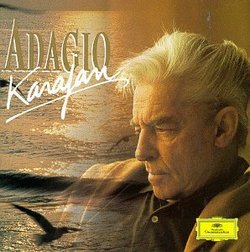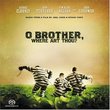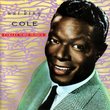| All Artists: Gustav Mahler, Johann Pachelbel, Jules Massenet, Johannes Brahms, Antonio Vivaldi, Edvard Grieg, Wolfgang Amadeus Mozart, Tomaso Albinoni, Ludwig van Beethoven, Johann Sebastian Bach, Jean Sibelius, Herbert von Karajan, Berlin Philharmonic Orchestra, David Bell Title: Karajan: Adagio Members Wishing: 0 Total Copies: 6 Label: Deutsche Grammophon Release Date: 5/16/1995 Genre: Classical Styles: Chamber Music, Forms & Genres, Concertos, Serenades & Divertimentos, Suites, Theatrical, Incidental & Program Music, Historical Periods, Modern, 20th, & 21st Century, Symphonies Number of Discs: 1 SwapaCD Credits: 1 UPCs: 028944528220, 028944528220, 028944528220 |
Search - Gustav Mahler, Johann Pachelbel, Jules Massenet :: Karajan: Adagio
 | Gustav Mahler, Johann Pachelbel, Jules Massenet Karajan: Adagio Genre: Classical
![header=[] body=[This CD is available to be requested as disc only.]](/images/attributes/disc.png?v=430e6b0a) ![header=[] body=[This CD is available to be requested with the disc and back insert.]](/images/attributes/disc_back.png?v=430e6b0a) ![header=[] body=[This CD is available to be requested with the disc and front insert.]](/images/attributes/disc_front.png?v=430e6b0a) ![header=[] body=[This CD is available to be requested with the disc, front and back inserts.]](/images/attributes/disc_front_back.png?v=430e6b0a) |
Larger Image |
CD DetailsSimilarly Requested CDs
|
CD ReviewsGentle, Slow, Reflective...and Wonderful Alex Diaz-Granados | Miami, FL United States | 09/04/2003 (5 out of 5 stars) "Karajian's Adagio is, as the title of this 1994 album culled from previous recordings of the Berlin Philharmonic Orchestra, a CD devoted to the "adagio," a slow, gentle tempo that first became widely used in the Baroque period of music. An adagio can be either part of a greater whole (the Allegretto or 2nd Movement from Beethoven's Seventh Symphony in A major) or a complete self-contained composition (the "Valse Triste/Sad Waltz by Sibelius). The best known pieces in this collection from Deustsche Gramophon are perhaps Pachelbel's Canon in D, which features a gentle melody that is played first by one section of the orchestra, then repeated and taken up by other sections, becoming more intricate as the piece ascends to a shimmering conclusion. The other widely known composition, Tomaso Albinoni's Adagio in G minor, sounds as if it was a Baroque piece from the late 17th Century, but it was neither composed by Albinoni nor is it a Baroque-period work. It's actually a 20th Century forgery executed by Albinoni's biographer Remo Giazotto. Nevertheless, it's a powerful and deeply moving piece, marked by the somber interplay of organ and strings. (This piece was used, with great effect, in the latter section of Australian director Peter Weir's 1980 film Gallipoli.)Karajan's Adagio spans several centuries and musical eras, from the aforementioned Baroque to the post-Romantic 20th Century. In addition to Albinoni/Giazotto, Pachelbel, Sibelius, and Beethoven, listeners will find compositions by Mozart, Massenet, Vivaldi. Brahms, Grieg, Mahler, and J.S. Bach. With such a diverse group of composers, even though the pieces are leisurely and gentle, they also express a wide range of musical moods, ranging from the pathos of Grieg's Anse's Death to the pastoral tranquility of Mozart's 4th Movement from his Divertimento in B-flat major." If you wish the moderate baroque music, Masahiko OKAZAKI | Kochi, JAPAN | 07/23/2002 (3 out of 5 stars) "Disappointed is the Canon of Pachelbel. The score is partly omitted and the temp is too rhythmical like a march. On the other hand the Adagio of Albinoni is orchestrated beautifully except the pipe organ which sounds after-recording. The Air is normal. If you wish the baroque music above, compare others." Not for Pachelbel fans Adrian | Mexico City, Mexico | 05/01/2006 (4 out of 5 stars) "Karajan was an amazing conductor. Precise, demanding, exacting, but also emotional and deeply sensible to nuances and subtleties of the various works and comosers he conducted. He's amazing with Beethoven and Wagner, for instance.
With Pachelbel, however, something didn't click. I have at least three Karajan recordings of the Canon in D -as well as over 50 other versions- and none are as brief, "martial", cut-and-dry, hurry-up-and-leave like Karajan's. Don't ask me why, but it would seem that conducting Pachelbel was something he didn't enjoy. The rest of the album, however, is very enjoyable, smooth, melodious, and thoroughly enjoyable and commendable. So, in a nutshell: if you've had it with Pachelbel's Canon in D, this is a great recording for you. If, on the other hand, you really love the Canon, skip it while playing this album or, for that matter, any of Karajan's recordings of it, where you'll also find this report, as I have collected them all: my acoustical masochism knows no boundaries. I hope this helps you in your selection. Enjoy! " |

 Track Listings (11) - Disc #1
Track Listings (11) - Disc #1








